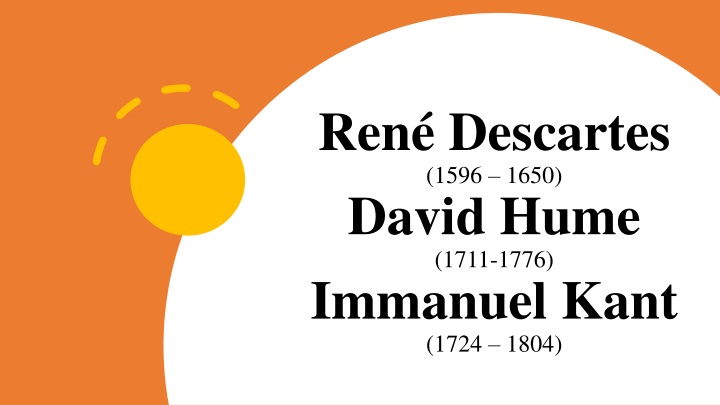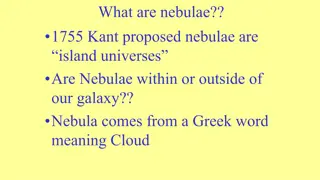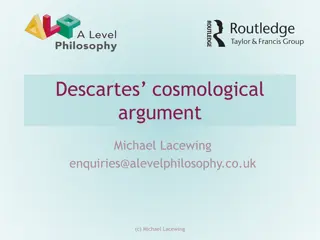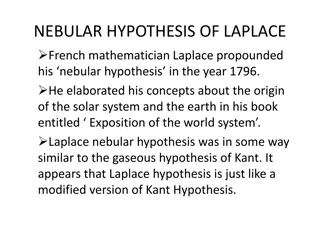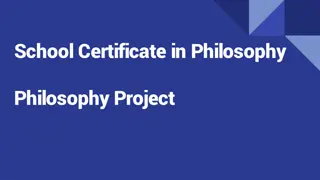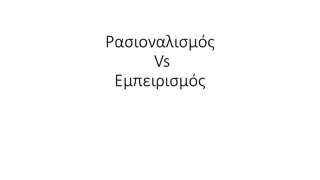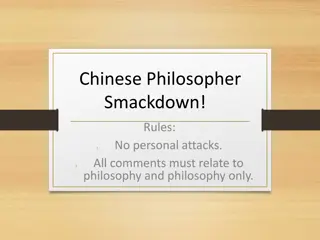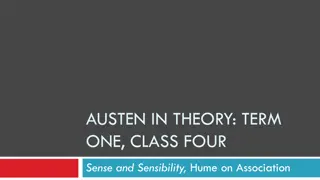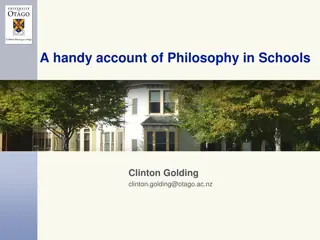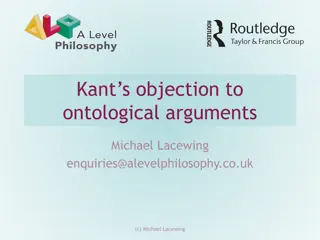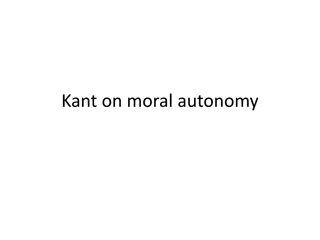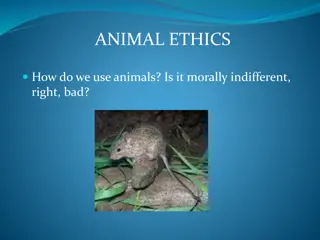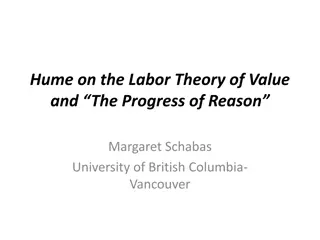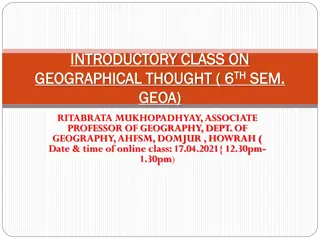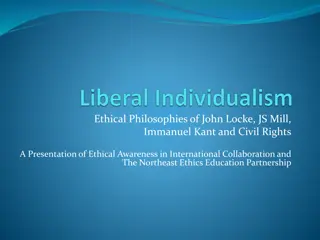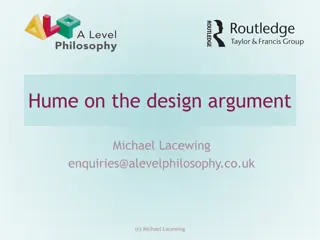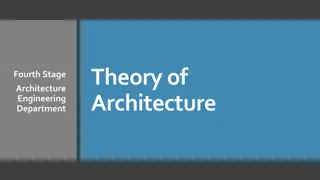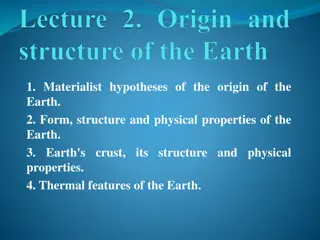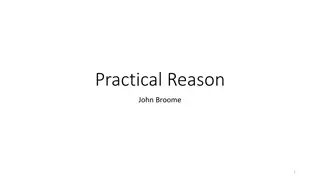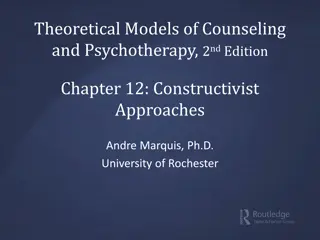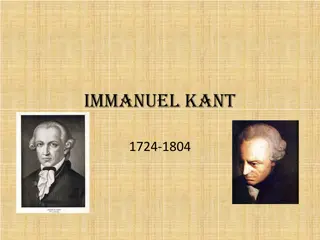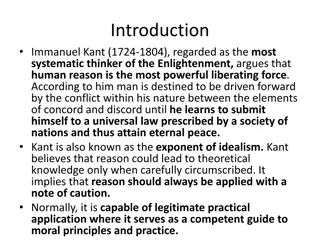A Dive into Philosophical Thought: Descartes, Hume, Kant, and More
Explore the intellectual landscape of renowned philosophers like René Descartes, David Hume, Immanuel Kant, and other influential figures such as Nicolaus Copernicus and Martin Luther. Delve into Descartes' meditations on doubt, the nature of the human mind, and the example of wax, reflecting on foundational concepts in philosophy and science that have shaped our understanding of the world.
Download Presentation

Please find below an Image/Link to download the presentation.
The content on the website is provided AS IS for your information and personal use only. It may not be sold, licensed, or shared on other websites without obtaining consent from the author.If you encounter any issues during the download, it is possible that the publisher has removed the file from their server.
You are allowed to download the files provided on this website for personal or commercial use, subject to the condition that they are used lawfully. All files are the property of their respective owners.
The content on the website is provided AS IS for your information and personal use only. It may not be sold, licensed, or shared on other websites without obtaining consent from the author.
E N D
Presentation Transcript
Ren Descartes (1596 1650) David Hume (1711-1776) Immanuel Kant (1724 1804)
Ren Descartes
Nicolaus Copernicus 1473 1543 astronomer formulated a model of the universe that placed the Sun at its center. Martin Luther 1483 1546 doubts the legitimacy of indulgences, the authority of the pope, discovering of Jesus and salvation by faith alone. Galileo 1564 1642 improved telescope, astronomical observations and support for Copernicanism. The father of modern observational astronomy, modern physics, modern science. Ren Descartes 1596 1650 French philosopher, mathematician, father of modern philosophy and science, the Cartesian coordinate system, and much more.Born March 31, 1596, France died February 11, 1650, Stockholm, Sweden.
Meditations on First Philosophy Originally published: 1641
Meditation I: Concerning Those Things That Can Be Called into Doubt Many falsehoods he believed in his life and on the sciences built upon these falsehoods. Solution is to start from zero to find solid grounds. Problem:Everything we accept as true, we ve acquired through our senses, which are deceiving; dreams for example. Thus, to ground a reliable science we must doubt everything. Overturn Aristotelian science, which relies on the senses. Show exactly how the senses very often give us wrong data.
Meditation II: Concerning the Nature of the Human Mind: That It Is Better Known Than the Body Provide clear and distinct ideas to believe that the ideas accurately represent the outside world. I think therefore I am . This is a self- evident truth or tautology or axiom. Once he finds one indubitable truth (that I exists) he seeks to find out what I is and then look and see if there are other such clear and distinct ideas. But what am I? A thinking thing. And what is that? Something that doubts, understands, affirms, denies, wills, refuses, and senses and has mental images.
Example of wax How do we know things? I know about wax not because of its color, texture or shape, as all these things can change, and the substance still be wax. He believes that wax is perceived by the intellect alone . Therefore, he distinguishes between ordinary perception through senses and judgment through reason/intellect. If a substance such as wax can be known in this fashion, then the same must be of ourselves. The self, then, is not determined by what we sense of ourselves these hands, this head, these eyes but by simply the things one thinks. Thus, one can t grasp anything more easily or plainly than [his] mind.
Meditation III: Concerning God, That He Exists Descartes proposed that there are three types of ideas: Impossible = a round square. Contingent = ideas from experience, also unicorns. Necessary = numbers, God. He argues that the idea of God is Innate and placed in us by God, and he rejected the possibility that the idea of God is contingent or impossible. Descartes argued that he had a clear and distinct idea (self-evident) of God (Like I think, thus I am). My idea of God, a perfect being, could not have been caused by anything less than a perfect being.
Meditation IV: Concerning the True and the False The conclusions of the previous Meditations that I and God both exist lead to a problem: If God is perfectly good and the source of all that is, how is there room for error or falsehood? If I ve gotten everything in me from God and He hasn t given me the ability to make errors, it doesn t seem possible for me ever to err. God s perfect goodness vs. the extreme opposite end of the scale is complete nothingness, which is the evilest state possible. Humans are an intermediary between these two extremes; thus, error (as a part of evil) is not a positive reality, but rather the absence of what is correct. In this way, its existence is justified in concomitance with God.
Meditation V: Concerning the Essence of Material Things, and Again Concerning God, That He Exists Before asking if external objects exist, I ought to consider the ideas of these objects as they exist in my thoughts and see which are clear and which confused. I find in myself innumerable ideas of things that, though they may not exist outside me, can t be said to be nothing. While I have some control over my thoughts of these things, I do not make the things up: they have their own real and immutable natures. For example, a mental image of a triangle. This figure has a fixed nature, immutable and eternal, which hasn t been produced by me and isn t dependent of my mind.
While thinking about the independence of these ideas of external objects, Descartes realizes that he is just as certain about God as he is about these mathematical ideas. He asserts that this is natural as the ideas of God are the only ideas that imply God s existence. One cannot picture a mountain without a valley; but it s possible that these do not exist. However, the fact that one cannot conceive of God without existence inherently rules out the possibility of God s non-existence. Simply put, the argument is framed as follows: 1. God is defined as an infinitely perfect being. 2. Something cannot be perfect without existing. 3. So, God exists.
It seems that a similar argument can prove the existence of a supremely perfect island: 1. I have an idea of a supremely perfect island. 2. Existence is a perfection. 3. Therefore, a supremely perfect island exists. Right?
p1. God is the supremely perfect being, a being than which none more perfect can be conceived. p2. We can conceive of a supremely perfect being existing in reality. p3. What exists in reality is more perfect than what exists only in conception. From these three premises, the argument proceeds as follows: 1. Suppose: God does not exist. 2. Then, we can conceive of a being that is more perfect than God. 3. But this would be a contradiction, since God is the supremely perfect one. 4. Therefore, God exists.
1711-1776 David Hume s An Enquiry Concerning Human Understanding (1748)
He argues that perceptions may be of two kinds: (1) thoughts (or ideas), and (2) impressions (or sensations). All ideas are copied from impressions (sensory experience). There are no ideas (none!) that are innate in the human mind. Every idea is originally derived from a sensory perception. Ideas are either copied directly from impressions or formed by the conjunction of two or more (Complex ideas).
Two arguments: 1. Take any idea and you ll be able to break it down into simple ideas, each of which corresponds to a simple impression: Examples: God = Man + infinite intelligence, infinite power, etc. Golden Mountain = Gold + mountain. Angel = Woman + wings. Green Martians = Man + antennas + green. If you can produce an idea that cannot be broken down into pieces, then innate ideas can exist. 2. If you don t have the impression, you cannot have the idea: Example: If you re blind since birth, you don t know colors. If you re deaf since birth, you don t know sounds.
Reasoning is of two kinds: (1) relations of ideas (2) matters of fact Relations of ideas: Mathematical equations. Relations of ideas are a priori, discoverable by reason alone, not depend on sensory experience. Matters of fact: a posteriori, not discoverable by reason alone, depend on sensory experience. (Analytic vs. Synthetic).
Analytic truths are not knowledge. They are tautological. Our knowledge proper comes through matters of fact. But reasoning concerning matters of fact is based on the relation of cause-and- effect, which is not discoverable by reason alone. Every effect is distinct from its cause, and every cause is distinct from its effect. Therefore, an effect cannot be discovered in a causal object or event merely by a priori reasoning. All arguments concerning RI are based on reasoning about relations of cause-and-effect. Cause-and-effect relations must ultimately be proven or disproven by experience. But any conclusions from experience assumes that the future will conform to the past.
We cannot prove that there is any necessary connection between a cause and an effect; can only demonstrate that an event and another may be temporally or spatially contiguous, regular in succession, and constantly conjoined. Worse: we cannot prove that there is any necessary connection between internal events in the mind. There is no I think therefore I am (Bundle of perception). Principle of Sufficient Reason: Every event must have a cause or at least an explanation for its existence either in itself or in something else. When we explore the nature of causation, we find that we cannot prove that a cause is necessarily that by which something exists.
Even worse: We may try to show that this external world exists independently of our perceptions of it. However, there is no logical necessity for this conclusion. Based on our own sensory experience, we cannot prove that there is any necessary connection between our perceptions of the world and the world as it really exists. We have only our sensory perceptions as evidence of whether the external world really exists, and thus we cannot reach any conclusions about a necessary connection between our perceptions of the world or objects in the external world.
Thus, knowledge is possible of relations of ideas, but that any truths concerning matters of fact (or of existence) are incapable of being proved to be logically necessary. All knowledge of matters of fact must ultimately be based on experience, and that such knowledge cannot be based solely on reasoning about relations of logical necessity. Reasoning about matters of fact may be based on previous experience of how they are related to each other but cannot prove that any relation of cause-and-effect between matters of fact is logically necessary. Thus, any theological or metaphysical arguments that we may make about the nature of ultimate reality is a matter of faith rather than of reason.
Implications: Many aspects of human understanding may not be governed by the principle of necessity. Human understanding may not be logically necessary. Human understanding may be limited by a lack of necessary connection between its perceptions and true reality. Thus, Hume s investigation of the nature and limits of human understanding reveals a profound moral doubt and skepticism.
Hume perceptions are of two kinds: (1) Ideas (2)Impressions All ideas are copies of impressions from our senses There are no ideas (none!) that are innate in the human mind. Every impression forms a particular idea. Ideas mix together to form Complex Ideas.
Two arguments: 1. Any idea is analyzable and reduced to simple ideas, each of which corresponds to a simple impression: Examples: God = Man + infinite intelligence, infinite power, etc. Golden Mountain = Gold + mountain. 2. If you don t have the impression, you cannot have the idea: Example: If you re blind since birth, you don t know colors. If you re deaf since birth, you don t know sounds. If you never had papaya, you can t know its taste. If you never experienced the causation, you cannot have that idea.
Reasoning is of two kinds: (1) Relations of ideas (2) Matters of fact Relations of ideas: Always analytic, known a priori, the opposite is impossible: Mathematics, geometry, a bachelor is an unmarried man. Matters of fact: Always synthetic, known a posteriori, the opposite is possible. Bachelors are happy, children play in the playground near my house.
Hume attacks knowledge at its very source: Cause and Effect. He demonstrated irrefutably that it is impossible for reason to think a priori and by means of concepts the notion of necessity and causation. We cannot see that every event has a cause. Gasoline on my flowers Where is the link between the two? So, reason is altogether deluded with reference to causation. Experience (habituation) gives us that delusion. Reason has no power to penetrate the secrets of reality. In plain language there is not, and cannot be, any knowledge. Why? What we call Knowledge is nothing more than habituation caused by a delusion that the future must resemble the past.
Kant acknowledges Humes distinction between judgments of Relations of Ideas and Matters of Fact using the new labels Analytic and Synthetic : There is a distinction in judgments, as to their content, according to which they are either merely explicative, adding nothing to the content of our cognition, or expansive, increasing the given cognition. Analytic judgments are explicative: A bachelor is an unmarried male . I have not amplified my concept of bachelor but have only analyzed it. On the contrary, Some bachelors eat spaghetti , contains in its predicate something not actually thought in the general concept of the bachelor: it amplifies my knowledge by adding something to my concept, this is synthetic.
Now Kant makes the point that analytic judgments are knowable a priori because their denial is logically impossible; thus the law of contradiction is their common principle : All analytical judgments depend wholly on the law of Contradiction and are in their nature a priori cognitions. Because synthetic judgments are such that their denial is logically possible, then it is impossible to know anything/ Why? Because it is logically possible that everything that we come to know is the opposite! But does the synthetic-analytic distinction exhaust the options? Kant shows that Hume and Descartes overlooked the true source of knowledge Synthetic a priori judgments.
Synthetic a priori Kant recognizes the importance of Hume s skeptical conclusion but disagrees; he thinks Hume has made a fatal mistake in not recognizing the possibility of synthetic a priori knowledge. Hume is correct, Kant agrees, that causal judgments cannot be justified empirically; therefore, their justification must be a priori ( sprang from the pure understanding ) Kant observes: mathematical judgments are synthetic yet not empirical. Hume would vehemently deny this Mathematical judgments are all synthetic. This fact seems to have escaped the observation of those who have analyzed human reason.
All proper mathematical judgments are necessary, and not empirical, because cannot be obtained from experience. Thus, the existence of mathematics establishes that some synthetic judgments can be known a priori. Take 7 + 5 = 12; The concept of 12 is by no means thought by merely thinking of the combination of seven and five. Hence our concept is really amplified by the proposition 7 + 5 = 12, and we add to the first a second, not thought in it. Arithmetical judgments are therefore synthetic. The principles of geometry are the same. That A straight line is the shortest path between two points is a synthetic proposition: My concept of straight line contains nothing about the concept of shortest distance between two points. The attribute of shortness is therefore altogether additional, and cannot be obtained by any analysis of the concept.
Hume was correct in claiming that experience cannot provide necessity; it is provided by the understanding This is how the understanding structures the world of experience. The necessity connecting events or thoughts, which Hume couldn't find in rationality, is provided by the understanding itself. Since this has been derived a priori it is universally and necessarily true. At the same time, this argument shows that we are independent observers and there is a nature, a world, out there. But we cannot know the world in itself, but only its objective representation to our cognition through our apparatuses.
In addition to causality, which is the very form of the understanding, there are other faculties or strictures of the mind through which we can know things: Math = time Geometry = space
